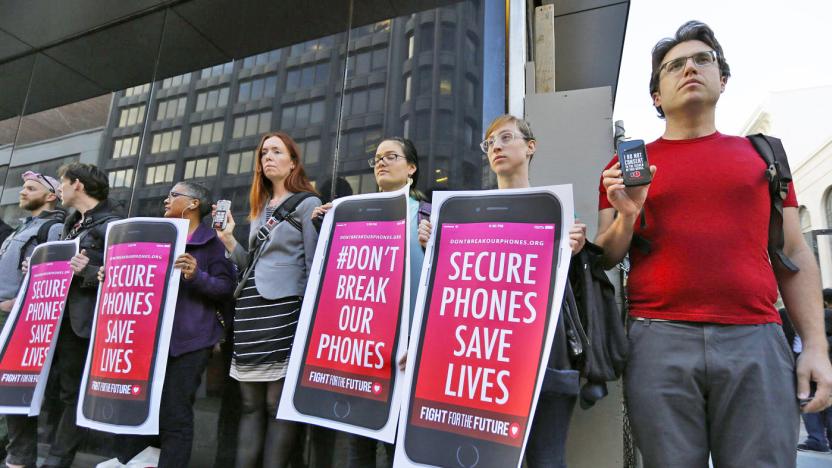Senate
Latest

Anti-encryption bill changes would limit some effects on security
A Senate bill that would demand encryption backdoors may be on ice for now, but it's now poised to come back -- with a few limitations. Just Security claims to have obtained proposed changes to the bill that would scale back its requirements to placate critics of its effect on privacy and security. Some of them could make a meaningful difference, but there's a concern that this wouldn't change the underlying problems with the legislation.

'Hamilton' creator Miranda joins the fight against ticket bots
Hate that ticket bots robbed you of a chance to see that big concert or musical? So does Lin-Manuel Miranda. The Hamilton author is teaming up with Senator Charles Schumer to promote a proposed federal bill, the Better Online Ticket Sales Act (BOTS Act, geddit?), that would fine bot users $16,000 for every ticket they sell. That's far harsher than in Schumer's own New York state, where a recently passed law tops out at a $1,000 total fine and no more than a year in prison. Miranda is coming aboard as proof that these bots can do real damage -- scalpers made roughly $15.5 million from Hamilton alone, and jacked prices from $189 to as much as $2,000. It'd also start a task force that would detect these bootleggers.

Senate approves national GMO labeling standard
The Senate has voted 63-30 in favor of a bill that would enforce a GMO labeling standard for the whole country. If it passes, food manufacturers would be required to disclose genetically modified ingredients in their products through a label on an item's packaging. It doesn't mean bad news for those manufacturers, though -- in fact, the bill's requirements work in their favor. A more stringent GMO labeling law went into effect in Vermont on July 1st, and food companies were unhappy because it could lead to different laws per state that would be a nightmare to implement.

Warrantless data searches narrowly miss Senate approval
A Senate amendment that would have allowed the FBI to search a suspect's phone and online records without a court order came very close to becoming a reality today. The legislation, introduced by Senators John McCain (R-AZ) and Richard Burr (R-NC) in the wake of the recent mass shooting in Orlando, missed the necessary 60 votes it needed to pass by just two votes.

Senate anti-encryption bill is effectively dead, for now
If you were worried that a possible Senate bill requiring encryption backdoors would get enough support to become law, you can relax... for a while, at least. Reuters' government tipsters claim that the proposal, drafted by Senators Richard Burr and Dianne Feinstein, has lost most of its support. It won't be introduced this year, the insiders say, and would have no real chance even if it did go up for a vote. The White House's reluctance to back the bill (in public, anyway) is the main factor, but even the CIA and NSA were "ambivalent" knowing that it could hurt their own encryption.

Senator behind biometric privacy act tries to remove its teeth
The Illinois Biometric Privacy Act became law in 2008, making it illegal in the state to capture a person's biometric identifiers -- things like fingerprints, iris scans or faceprints -- without explicit consent. This has led to three lawsuits against Facebook, Google and Snapchat, each over the companies' use of face-scanning or -tagging technology. Now, Illinois State Senator Terry Link is attempting to add language to the bill that would make these practices legal in the state, effectively ending the lawsuits, The Verge reports. Note that Link is the senator who originally introduced the Illinois Biometric Privacy Act.

Senate introduces bill to limit the FBI's new hacking rules
A bipartisan group of senators have introduced a new bill called the Stop Mass Hacking Act that would block expanded hacking powers the U.S. Department of Justice claims are necessary to keep up with "sophisticated 21st century criminals."

Government officials can no longer be ignorant about cybersecurity
It's sort of cute when someone you know, usually an older family member, announces that he doesn't understand Facebook or smartphones. It's far less endearing when elected officials and law enforcement flaunt their ignorance of technology and cybersecurity.

Submit your questions for the US Senate's first open debate
Normally, the press frames important US election debates by choosing the questions and controlling the video broadcast. For the first time, however, the public will decide the agenda in a clash over a contested US Senate seat. Republican David Jolly and Democrat Alan Grayson are vying for Marco Rubio's vacated Florida Senate post, and will lock horns on April 25th at 7PM eastern time in the Florida Open Debate. The public will be able to submit questions for the event, hosted by the Open Debate Coalition, starting today at 6AM until the cutoff at 12PM ET on April 25th.

Senate to Americans: Your security is not our problem
The Senate Intelligence Committee just released a draft of long-awaited legislation to tackle the problem authorities have with encrypted communications. Namely, because encryption is so secure, it interferes with court orders in the same way private property poses problems for police who just want to get things done.

Read the full Senate bill requiring encryption backdoors
If you were skeptical that polticians would be so audacious as to propose a law effectively requiring encryption backdoors... well, you just got proof. The Senate has released a finished version of Richard Burr and Dianne Feinstein's Compliance with Court Orders Act, which demands that companies either produce data in a readable format when asked or else offer whatever help they can to make that data accessible. Despite the early uproar, little has changed between the draft and the finished bill -- the only big difference is that it explains which crimes can invoke the requirement. >Burr-Feinstein Encryption Bill by The Daily Dot

Senators work on what might be the most anti-encryption bill yet
The White House might have avoided serious backlash by refusing to back an encryption bill being worked on by the offices of Senators Richard Burr and Dianne Feinstein. Kevin Bankston, director of New America Foundation's Open Technology Institute, told Wired that in his 20 years working in tech policy, "this is easily the most ludicrous, dangerous, technically illiterate proposal" he's ever seen. Wired even notes that privacy experts thinks it's so bad, it's good, because it's very unlikely that the bill will become law as it is.

Senate holds Backpage in contempt in child trafficking probe
The Senate has unanimously voted (96-0) to hold Backpage, a classified ads website, in contempt of Congress. See, Homeland Security's Permanent Subcommittee on Investigations issued subpoenas last year, asking Backpage for extensive documentation on how it screens the ads people post. The company, however, only shared general documents that didn't contain the information the subcommittee needed. Lawmakers are investigating the website due to allegations that it allows child sex-trafficking ads to go through. Further, lawmakers say its screening practices even help traffickers avoid prosecution by editing ads and using buzz terms like "fresh" to indicate underage prostitutes.

Budget bill heads to President Obama's desk with CISA intact
Earlier today, the US House of Representatives passed a 2,000-page omnibus budget bill that contains the entirety of the controversial Cybersecurity Information Sharing Act. Just moments ago, the Senate passed it too. Now the bill is on its way to President Barack Obama's desk, where he has the option to veto it... except he almost certainly won't. The gargantuan document lays out a $1.15 trillion spending plan that has received solid (if not unanimous) support from both sides of the aisle and should prevent a government shutdown like the one we saw in 2013. But at what cost?

US Senate passes controversial CISA bill
The US Senate convened for a vote on the controversial Cybersecurity Information Sharing Act (CISA) today as well as five amendments to it. All five amendments, which would have restrained law enforcement from abusing the bill's powers as well as made corporations more accountable for their roles in protecting consumer information, have failed. A cloture motion, which prevents filibustering the initiative, passed at the start of the session today by a vote of 83 - 14. The bill itself passed the Senate with a 74 - 21 vote (it needed 60). It must now do the same in the House before being either signed into law or vetoed by the President.

Emailing your members of Congress just got much easier
It's supposed to be easier to email Congresspeople than it is to pick up the phone, but that's not always how it works in practice. Just ask anyone who has navigated convoluted web forms just to voice opposition to a bill, for starters. You won't have to put up with those technical hurdles after today, though. The Electronic Frontier Foundation's new Democracy.io site helps you email House and Senate representatives without having to dig around their sites. You can even email all of your politicians at once, if there's a concern that stretches across both legislative branches. There's no guarantees that officials will listen when you fire off your messages, but you'll at least get to say that you exercised your civic responsibility. [Image credit: TTarasiuk, Flickr]

Watchdog on recent IRS hack: We told them so
The IRS web portal is no digital Fort Knox, officials from IRS watchdog Treasury Inspector General for Tax Administration (TIGTA) told the Senate Finance Committee on Tuesday. In fact, J. Russell George, the Treasury Inspector General for Tax Administration, laid out a strong critique of the tax agency's ability to defend itself from cyber-attacks. Specifically, he cited dozens of security upgrades that had been recommended by his group -- but not implemented by the agency -- that would have reportedly made the most recent data breach "much more difficult" to pull off.

Senate passes USA Freedom Act (update: signed by Obama)
For the first time since the 9/11 attacks, both houses of Congress have agreed to limit the government's domestic surveillance powers. Earlier today, the Senate voted 67 to 32 and passed the USA Freedom Act, echoing the House's vote in May. The bill is designed to counter the Patriot Act's controversial section 215 -- the bit that enabled the NSA to collect phone records en masse, request "roving wiretaps" and seize business files -- just one day after the provision officially expired. Update: According to several press reports, tonight President Obama signed it into law.

US limits the NSA's reach ahead of sweeping reform
The Senate has voted overwhelmingly to reform the powers of America's security services, at the expense of renewing existing provisions of the Patriot Act. In a contentious debate leading up to midnight, the house belatedly opted to support the USA Freedom Act, which will eventually end the bulk collection of phone metadata. By opting not to extend the existing legislation, agencies such as the NSA and FBI will supposedly no longer have unfettered access to our phone records, be able to request "roving wiretaps" or seize business records for an investigation.

Senate blocks NSA reform bill and Patriot Act extensions
The USA Freedom Act aimed at addressing the NSA's bulk collecting of phone call metadata was approved by the House of Representatives ten days ago, but blocked by the Senate tonight (live video stream here). The Section 215 provisions of the Patriot Act used to enact the program are set to expire June 1st, and it could go away if a compromise isn't reached to extend it. Senator Rand Paul of Kentucky filibustered to push the vote to this late hour, while Sen. Mitch McConnell pushed for a series of extensions to the program, claiming the security of the country could be at risk. The Senate is taking a weeklong Memorial Day break, but will come back on May 31st for more discussion and probably more voting. The voting is done for tonight, but we expect much more discussion over the next week.









